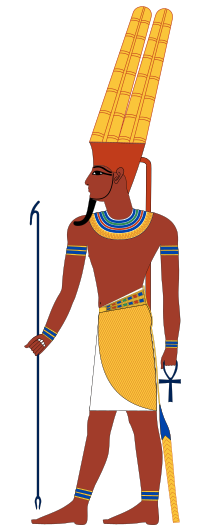Zeus Ammon
| Amun, Amun-Ra, Amun-Re, Amon, or Amen |
|||||
|---|---|---|---|---|---|
| King of the gods and god of the wind | |||||

|
|||||
| Name in hieroglyphs |
|
||||
| Major cult center | Thebes | ||||
| Symbol | two vertical plumes, the ram-headed Sphinx (Criosphinx) | ||||
| Consort |
Amunet Wosret Mut |
||||
| Offspring | Khonsu | ||||
| Greek equivalent | Zeus | ||||
Amun (also Amon, Amen; Greek Ἄμμων Ámmōn, Ἅμμων Hámmōn) was a major Ancient Egyptian deity. He was attested since the Old Kingdom together with his wife Amaunet. With the 11th dynasty (c. 21st century BC), he rose to the position of patron deity of Thebes by replacing Monthu.
After the rebellion of Thebes against the Hyksos and with the rule of Ahmose I (16th century BC), Amun acquired national importance, expressed in his fusion with the Sun god, Ra, as Amun-Ra or Amun-Re.
Amun-Ra retained chief importance in the Egyptian pantheon throughout the New Kingdom (with the exception of the "Atenist heresy" under Akhenaten). Amun-Ra in this period (16th to 11th centuries BC) held the position of transcendental, self-createdcreator deity "par excellence", he was the champion of the poor or troubled and central to personal piety. His position as King of Gods developed to the point of virtual monotheism where other gods became manifestations of him. With Osiris, Amun-Ra is the most widely recorded of the Egyptian gods.
As the chief deity of the Egyptian Empire, Amun-Ra also came to be worshipped outside of Egypt, according to the testimony of ancient Greek historiographers in Libya and Nubia. As Zeus Ammon he came to be identified with Zeus in Greece.
...
Wikipedia
